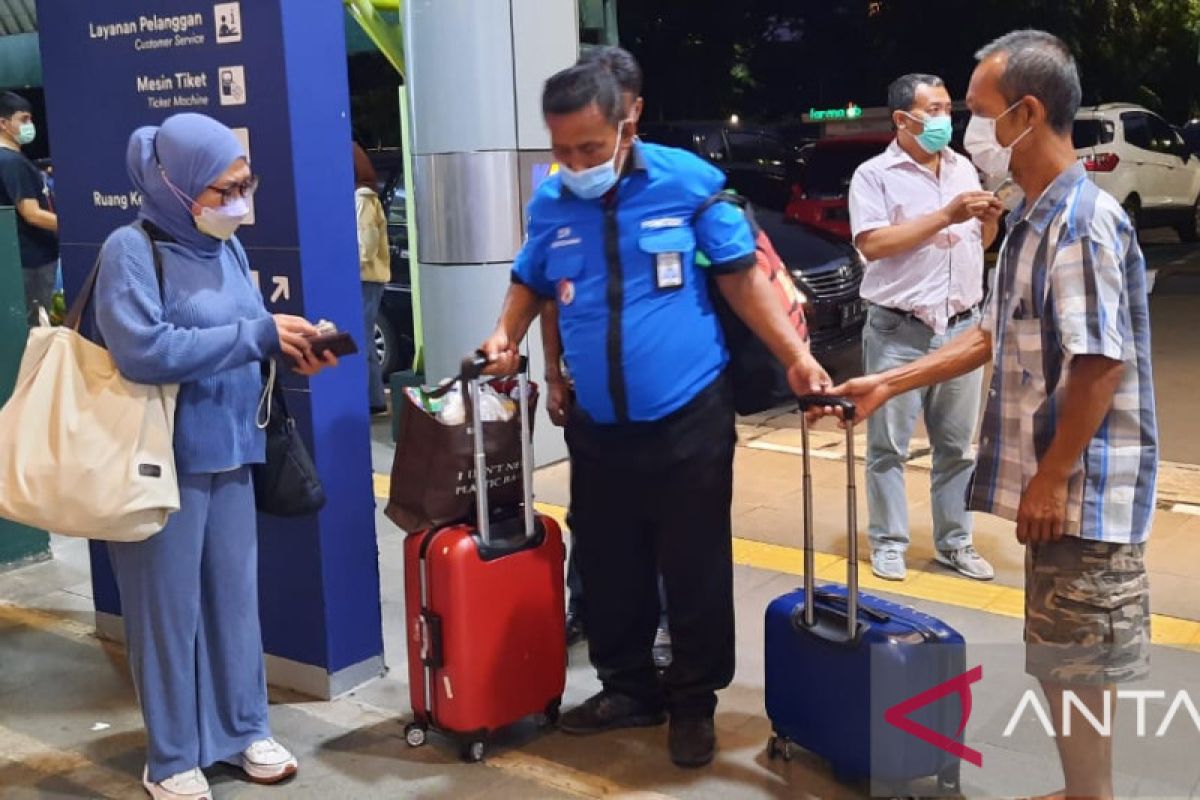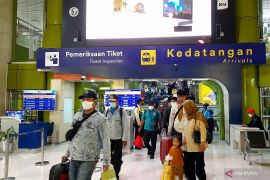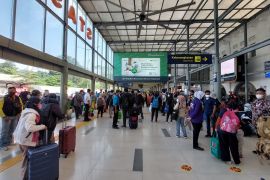While security officers and railway staff continue to serve passengers, announcers informing of the arrival of trains and COVID-19 health protocols are also audible every minute.
Apart from passengers and railway staff, some uniformed men in blue shirts and black trousers are also spotted throughout the station, either at the station's main gate, at the waiting hall, or in the parking area.
A gentleman then approached one of the uniformed man, Rohim, aged 40, who was eating bread in front of a fast-food restaurant in the station’s main hall.
“Can somebody help me bring my baggage?” the gentleman inquired, to which Rohim promptly responded by handing over his bread to fellow uniformed man Tarmudji, aged 45, and helping the gentleman bring his luggage.
Rohim’s day ended at 4:30 p.m. local time after an entire day of shift that he started at 5 a.m. local time. He is the station’s porter, a job that he has done for 11 years.
As a committee member of the station porters’ union, he stated that a total of 230 porters are working in Gambir Station. They are divided into two groups of 115 porters working in different shifts.
Every porter can be identified by their numbers, Rohim stated. He revealed that while his number is 114, Tarmudji’s is 96.
Pay us as you wish
Rohim said that unlike airport porters that receive regular wages every month, porters in railway stations are not paid by station operators. Hence, they rely only on the money they receive after providing services to passengers for their living.
Railway porters do not peg a price for their service, he remarked, adding that they can be paid from Rp10 thousand (US$0.69) to Rp50 thousand (US$3.45) for every service they provided. They can receive more money if they serve famous people or actors using railway services.
The largest sum of money is given by state officials, who are boarding the train, yet due to the rarity of the moment, the porters’ union rotates the opportunity to ensure all porters have a opportunity to serve them, he stated.
Even if railway porters receive an inconsistent amount of income each day, they sometimes refused to be paid by people they preferred. Rohim recalled that he once refused payment from a cleric, who hailed from his hometown, Jember in East Java, for he was sincere in assisting him.
“During the last Ramadan fasting, I met Gus Reza (Reza Ahmad Zahid), who runs an Islamic boarding school in Jember. I am familiar with him. I then help him carry his luggage to the train, and I refuse payment from him. I say, I am sincere in assisting you, and I seek your blessing,” Rohim stated while showing his selfie with the cleric.
Despite pegging no standard price for their service, Rohim said that the money he received, despite working for only 15 days due to the working shift division, is sufficient for his family in his hometown. The money is sufficient to meet his family’s daily needs and for paying his rent in Jakarta, he stated.
Some railway porters are even more fortunate, as they could pay for their children’s schools until the university or the military or police academy level, and some others have opened a business and purchased farmland in their hometown.
He admitted that the COVID-19 pandemic had significantly affected the railway porters’ income, as the government-enforced mobility restrictions barred residents from travelling, thereby causing them to lose their source of income.
The declining income compelled some porters to return to their hometowns. They only returned to Gambir Station when the pandemic situation subsided recently, Rohim stated.
“(Our income) declined by 50 percent (last year), but Praise be to God, the situation gradually becomes better now,” Tarmudji remarked.
Maintaining porters’ integrity
The duties of a railway porter at Gambir Station are not only to help carry passengers’ baggage but also maintain cleanliness at the station, especially outside the station hall.
During the start of their shift at 5 a.m. local time, porters will first sweep rubbish in the station before passengers start arriving there. They will also repeat this task at the end of the day after the last train departs.
Rohim stated that helping clean the station will make them comfortable with their workplace, and the duty is also consistent with his religious belief that cleanliness is part of faith.
Sometimes, they will find lost belongings that passengers left behind while sweeping the station, he stated, adding that the belongings range from cheap and simple stuff to expensive smartphones.
He recalled once having found a lost phone, whose value he estimated to reach Rp10 million (US$690), in an ablution area near the station’s praying room. He then handed over the phone to the station’s security officer, who then announced the lost belongings in the station’s public information system.
In case the owner had boarded their train and is no longer in Gambir Station, the porters will otherwise inform railway porters in all stations serving intercity routes -- Gambir Station being the only station exclusively serving intercity routes in Jakarta -- through online chat groups.
Rohim ensured that every lost belonging found by railway porters would be safely returned to its owner.
“It is our commitment as railway porters. If it does not belong to us, then it is not our right to take it,” he affirmed.
Rescuing and returning back the passengers’ belongings are part of the railway porters’ efforts to maintain their integrity and honest work ethics. It will positively impact their image as trusted assistants for railway passengers, he remarked.
Railway porters also follow a tradition every time a train departs: standing at the railway platform and saluting the departing train by bowing while placing the palm of their right hand on the chest.
The tradition, already in place for the last four years, is an obligation that every railway porter must perform, Rohim stated.
“This is a ritual to express our respect, bid railway passengers a safe trip, and express our gratitude to passengers that have used the railway porters’ services,” he remarked.
Related news: Manpower minister praises railway porters for services at stations
Related news: Establishing culinary tourism through rail transport concept in Madiun
Related news: KAI rejects 707 passengers for flouting health protocols
Translator: Laily Rahmawaty, Nabil Ihsan
Editor: Sri Haryati
Copyright © ANTARA 2022












